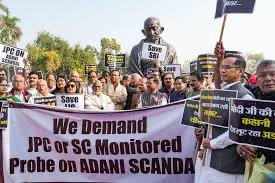On Friday, the Congress party reiterated its call for a Joint Parliamentary Committee (JPC) investigation into the Adani Group. This demand comes in light of an interim report by an expert panel appointed by the Supreme Court, which found no indications of regulatory failures surrounding the conglomerate’s stock rallies in recent years or the market decline following a short seller attack in January.
The Congress party’s persistent request for a JPC probe into the Adani Group stems from concerns regarding alleged improprieties and favoritism towards the conglomerate. They argue that a thorough investigation by a JPC would shed light on any potential wrongdoing and ensure transparency and accountability.
The expert panel, established by the Supreme Court, conducted a detailed examination of the Adani Group’s stock rallies and the subsequent market downturn. Their interim report indicates that there is no evidence of regulatory lapses or failures specifically related to the Adani Group. This finding has prompted the Congress party to assert that a JPC investigation is crucial to uncover any potential improprieties that may not have been adequately addressed in the interim report.
The Adani Group, headed by Gautam Adani, is a prominent business conglomerate in India with interests in diverse sectors such as infrastructure, energy, logistics, and ports. The group has experienced significant growth in recent years, becoming one of India’s largest corporations. However, allegations of preferential treatment and close ties to the government have surrounded the Adani Group, leading to calls for an in-depth investigation.
The Congress party’s demand for a JPC probe is rooted in their belief that a comprehensive inquiry is necessary to ascertain whether the Adani Group received any undue benefits or engaged in activities that may have violated regulations. They contend that a JPC, comprising members from different political parties, would provide an impartial platform to examine the conglomerate’s operations and address concerns surrounding its meteoric rise.
The Adani Group has consistently denied any wrongdoing and maintains that its operations adhere to the highest standards of corporate governance and compliance. They have also emphasized their commitment to transparency and cooperation with regulatory authorities.
The Congress party’s insistence on a JPC investigation reflects their role as an opposition party, holding the government accountable and ensuring the integrity of corporate practices. They argue that a comprehensive probe is essential to restore public confidence and uphold the principles of fairness and justice.
It is important to recognize that the interim report by the expert panel appointed by the Supreme Court does not completely absolve or condemn the Adani Group. The report solely indicates the absence of immediate regulatory failures. The Congress party contends that a JPC investigation would provide a more comprehensive understanding of the conglomerate’s operations, governance practices, and potential conflicts of interest.
The Congress party has once again demanded a Joint Parliamentary Committee probe into the Adani Group following an interim report by an expert panel appointed by the Supreme Court, which found no evidence of regulatory lapses specifically related to the conglomerate. The Congress party argues that a JPC investigation is necessary to address concerns regarding favoritism and potential improprieties. The Adani Group maintains its adherence to corporate governance standards and cooperation with regulatory authorities. The demand for a JPC investigation reflects the opposition’s role in ensuring transparency, accountability, and the preservation of fair business practices. It remains to be seen whether the call for a JPC probe will be heeded and what further actions will be taken to address the concerns surrounding the Adani Group.




